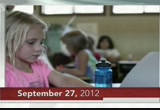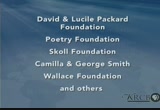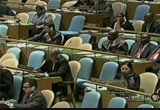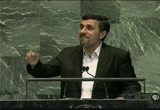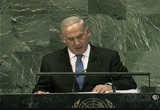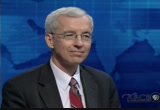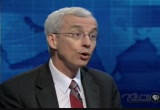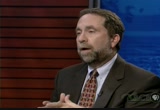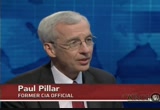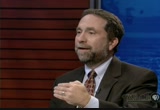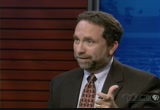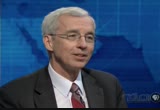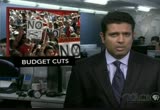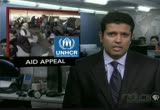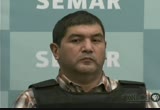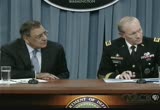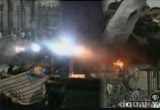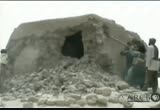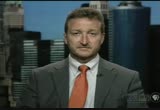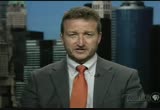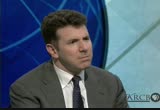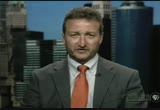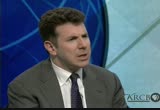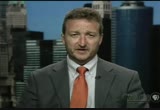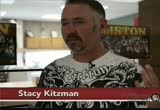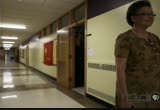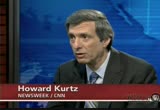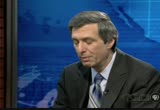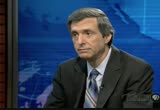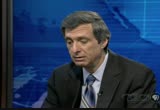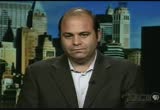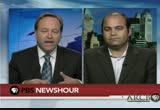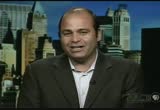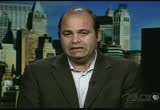tv PBS News Hour PBS September 27, 2012 5:30pm-6:30pm PDT
5:30 pm
>> woodruff: from our american graduate series, ray suarez reports on growing pains for north dakota schools brought on by the oil boom. >> i always make it very clear to any perspective teachers of what they are really getting themselves into. i tell them this is the new wild west. >> brown: on the "daily download," we examine how the candidates are using video games to push early voting. >> woodruff: and regular pro referees are back on the football field tonight after three weeks of questionable calls by replacements. we talk to npr's mike pesca about the deal struck with the nfl. >> brown: that's all ahead. on tonight's "newshour." major funding for the pbs newshour has been provided by: ♪ ♪
5:31 pm
moving our economy for 160 years. bnsf, the engine that connects us. and by the alfred p. sloan foundation. supporting science, technology, and improved economic performance and financial literacyn the 21st century. and with the ongoing support of these institutions and foundations. and... this program was made possible by the corporation for public broadcasting. and by contributions to your pbs station from viewers like you. thank you. >> woodruff: israel's prime minter warned again today that iran iwelln its way to creating a nuclear weapon and said the world needs to act. benjamin netanyahu spoke at the
5:32 pm
united nations. as he has often before, netanyahu condemned iran and its nuclear program, and called on other leaders to do the same. >> at stake is not merely the future of my country. at stake is the future of the world. and nothing could imperil our common future more than the arming of iran with nuclear weapons. >> woodruff: the israeli prime minister said the hour is, quote, "getting late" to stop iran as it continues its nuclear work. >> i speak about it now because the iranian nuclear calendar doesn't take time out for anyone or for anything. i speak about it now because when it comes the survival of my country, it's not only my right to speak, it's my duty to speak. >> woodruff: the prime minister's remarks came two days after president obama also spoke out against iran.
5:33 pm
>> a nuclear-armed iran is not a challenge that can be contained. it would threaten the elimination of israel, the security of gulf nations, and the stability of the global economy. that is why he united states will do what we must to prevent iran from obtaining a nuclear weapon. >> woodruff: but iran's president, mahmoud ahmadinejad, has long insisted that the country's nuclear program is only for peaceful purposes. and during his own speech yesterday, he denounced potential military action by israel. >> testing new generations of ultra-modern weaponry and the pledge to disclose these armaments in due time is now being used as a new language of threat against nations to coerce them into accepting a new era of hegemony. continued threats by the uncivilized zionists to resort to military action against our great nation is a clear example of this bitter reality.
5:34 pm
>> woodruff: earlier this week, iran unveiled a new long-range reconnaissance drone and the country's revolutionary guard said it tested new missiles as well. prime minister netanyahu noted that while international sanctions by the u.s. and other countries have hurt the iranian economy, they did not stop its nuclear program. >> there's only one way to peacefully prevent iran from getting atomic bombs. and that's by placing a clear red line on iran's nuclear weapons program. i believe that faced with a clear red line, iran will back down. and this will give more time for sanctions and diplomacy to convince iran to dismantle its nuclear weapons program altogether. >> woodruff: using a drawing of a fuse for illustration, netanyahu literally drew a line
5:35 pm
at the point before iran reaches the final level of uranium enrichment-- a step he says could be reached by next spring or summer. the united states has not gone as far, but the topic is expected to be discussed when secretary of state hillary clinton meets with the israeli prime minister later this evening. for more on all of this we get two views. paul pillar had a 28-year career at the c.i.a., much of it focusing on the middle east. he's now a non resident fellow at georgetown university. and robert satloff is executive director of the washington institute for near east policy, a washington think tank. and we thank you both for being with us again. let me start with you, paul pillar. did you hear something w in what primeminister netanyahu said today? >> not really. the prime minister, of course, has been agitating and warning on the subject for quite some time and going beyond mr. netanyahu we've seen over the last several years, in fact,
5:36 pm
progressive projections that iran is on the verge of a nuclear weapon. most of those projections have not borne out. but what we didn't get in this-- in the comments by the prime minister was really a clear sense of what his preferred red line would be. if we take literally what heid with his red marker on his prop it would suggest he's say nothing 90% enrichment. that is to say weapons grade enrichment. but he also said in his remarks that he did not want iran to complete-- that's his words-- the median stage, which refers to 20% enrichment. >> warner: it is clear, robert satloff, what red line he's talking about? >> it's very useful, i think, what the prime minister did because it cleared up a major ambiguity that separates the united states and israel on the objective of stopping iran's nuclear ambitions. president obama has said he
5:37 pm
wants to prevent iran from getting nuclear weapons. but what does that mean in practice? and what the prime minister did today was say that for israel it's not the weapon that matters it is stopping them earlier than that. there's a point in the enrichment process that we have to stop them which injects clarity into the debate about the overall obctive. >> woodruff: so you're saying there was something new there? >> i think it's very useful that he helped clarify the israeli view that the definition of prevention, of stopping a nuclear weapon does not mean just before you turn the screw on the final device. it has to be to be effective it has to mean earlier in the enrichment process. >> woodruff: why is that significant? you started out saying you didn't hear anything new but maybe that is? >> we've been hearing about red lines for quite some time from the prime minister and he hasn't specified exactly what it is.
5:38 pm
it's been car to all that uranium ren itchment is the long poll in the tent. but i think he still left vague as to whether he's talking about no 90-- and i don't think he'd be satisfied with just for that, because iran is not doing 90% enrichment now. >> woodruff: in fact he said they are well into the second stage of enriching enough medium riched uranium. that's something he said would be finished next year. >> well, it won't be finished next year. let me more specific, the international atomic energy agency in its port last month said that iran has produced 189 kilograms of this medium enriched uranium, the 20%. over half of that is already in the process of being converted to fuel planes for the tehran research reactor. so they have only about 91 kilograms right now, which is less than half of what you'd need even if you went to the additional step of 90% enrichment, which they are not doing. >> woodruff: so you're saying it's not as close as what he
5:39 pm
describes. robert satloff, how did you hear that? >> i heard it somewhat differently because what paul's comments don't incorporate are, a fenway pa sil tease of which we're not aware. b, an increase in the number of centrifuges that would increase the amount produced and, c, the possibility that iran uses more advanced centrifuges between now and some future date that would make more product more quickly. >> woodruff: so you're saying there's more capacity there than what is known? >> well, i don't know any secrets but i'm saying even at current levels of production the iranians could achieve amount needed foa nuclear weon sometime in 2013. >> woodruff: why isn't that correct? >> because it doesn't take into account, among other things, the fuel that was already made or is in the process of being made for the research reactor. that basically cut in half their stockpile, if you want to call it that, of the medium enriched uranium.
5:40 pm
>> woodruff: you're saying that makes a significant difference? >> that's a significant difference. so they aren't close to the amount they would need. if they took for more significant step of doing 90% weapons grade enrichment, and if they did that the i.a.e.a. would-- the inspectors would know immediately. >> woodruff: not to get too hung up on this point, but you're saying you don't accept that description? >> i'm saying at the current pace of production in 2013 the iranians will achieve enough for a nuclear weapon. and that the i.a.e.a. does not dispute. >> woodruff: let's go back to this question of what's the difference between what the prime minister said today and what president obama said two days somethat that what's the difference in the two positions? >> the difference is president obama has said no nuclear weapon and as rob i think has correctly underscoring, the prime minister is talking about something short of that with regard to the uranium enrichment. i think it's still vague as to exactly where the line is but those are two different things. >> woodruff: how do you see the
5:41 pm
difference? >> i think it's not so much a difference as clarity on what it means to prevent a nuclear weapon. of course, if they're just about to turn the screw it's too late to bomb them and prevent that. so what prime minister netanyahu did was offer israel's view of what a definition of prevention, a goal to which both governments agree what a definition would be in practice. >> woodruff: i was reading today there was disagreement inside netanyahu's own government that the israeli foreign ministry concludes that the economic sanctions are hitting iran hard calling for another round of economic sanctions. is that significant? >> the economic sanctions are hitting iran the iranian economy is in trouble and the reason why we haven't seen results with regard to the iranian negotiating position is that the p 5 plus 1 has not put on the table anythi in the way-- the united states and the other five powers that have been negotiating have not put on the
5:42 pm
table significant sanctions related-- basically no sanctions relate other than the airplane parts. >> here i disagree with paul very much. the economic sanctions have been a wonderful success and an abysmal failure. they've been a success at raising the economic cost to the iranians but if their real goal is to compel the iranians to change the nuclear policy they've had no visible impact. so that's the rub. the assumption of sanctions is that they will have an impact on iranian nuclear policy. so far that hasn't borne out. >> woodruff: and that's what the prime minister said today. >> they haven't borne out because the other side is not offering any significant in the one area which is the main reason iran has to negotiate and that has to do with relief from sanctions. rough where you have do we go from here? the prime minister said today that early next spring there could be military action as soon as next spring. is that what you heard that >> i've heard him say that up
5:43 pm
until next spring, a big push to push for more sanctions and pure more for diplomacy to resolve it and that there is a point most likely by next spring or early summer that perhaps military action is called for and so i think what you heard is a plea. world, step up your game. if you think economic sanctions are going to make the difference make them tougher otherwise other action is necessary. >> woodruff: how did you hear the? >> if nothing sells placed on the table, sanctions themselves won't do anything. it's a matter of-- one hopes, if you're asking me for how we get out of this, it would be a second term by obama or, if it were president romney working with the other p 5 plus 1 powers to put something on the table that does give iran an incentive. the kind of deal that is strikeable would be one that curtails or eliminates all together the 20% enrichment if
5:44 pm
it means relief from sanctions. >> woodruff: questions continue, gentlemen we thank you both. robert satloff, paul pillar. thank you. online, margaret warner writes how netanyahu, in setting a red line for iran, was also trying to set another sort of red line for the united states. find her blog post on the rundown. you can see all of the israeli prime minister's address and other highlights of the day on our web site. >> brown: still to come on the "newshour": the terror threat in libya; growing pains for north dakota schools; the campaigns play video games. and the referees go back to work. but first, the other news of the day. here's hari sreenivasan. >> sreenivasan: economic data released today painted a fuzzy portrait of how the u.s. economy is faring. jobless claims filed last week hit the lowest level in two months. but the commerce department revised its estimate of second quarter economic growth from 1.7% down to 1.3%. the economic numbers were fodder for republican presidential nominee mitt romney. at a campaign stop in springfield, virginia he said
5:45 pm
the slow growth was proof that president obama's economic policies have not worked. >> if you don't believe me why look at the price of gas and the jobs in your community and the members of your family that are struggling for good work. if you don't believe me look at the numbers that just came out in the growth of our economy. 1.3% versus russia at 4%, china at 7-8%, we are at 1.3% this is unacceptable. it is not working. i know what it takes to get things working. >> sreenivasan: 200 miles away in virginia beach, president obama acknowledged the economy is still struggling. but he also promised the crowd he'll push for an era of what he called economic patriotism. >> during campaign season you always hear a lot about patriotism. well you know wt? it's time for a new economic patriotism. an economic patriotism rooted in the belief that growing our economy begins with a strong and thriving middle class.
5:46 pm
i won't pretend that getting there is easy. the truth is it's going to take a few more years to solve challenges that were building up over decades. >> sreenivasan: in spite of the economic data, stocks on wall street made broad gains. the dow jones industrial average gained 72 points to close just under 13,486. the nasdaq rose more than 42 points to close at 3,136. overseas in spain today, th government announced a harsh new round of budget cuts to try and bring its economy back in line. but it was in the face of a massive public backlash. we have a report narrated by sarah smith of "independent television news." >> reporter: charging through streets of madrid last night, protestors were furious about the budget cuts they knew were going to come today. the police too will be hurt by the latest austerity measures but they still have to do their jobs. when economy ministers announced they were slashing yet more billions from government spending, the country ached when they also announced 43 new laws they say will fix the
5:47 pm
economy, the people shrugged. no one really believes that will work, because spaniards aren't working-- that's the problem-- unemployment is rampant now over 25%. whilst the property crash that started the crisis is still festering. further austerity measures will simply suck more money out of the economy and threaten an even deeper recession. spain is trying to save a total of 40 billion from its budget which will hurt. it won't be as excruciately painful as a new round of cuts in greece. they are trying to save an extra 12 billion from a budget that has already been pared to the bone. no one is spared the pain greece not even the most vulnerable. disabled protestors took to the streets today pleading for their benefits not to be cut further. they can no longer even afford the medicine they need they say.
5:48 pm
>> sreenivasan: the greek government today came to basic agreement on $15 billion worth of cuts in spending over the next two years. the country needs to make the cuts if it wants to keep receiving bailout loans from the e.u. and international monetary fund. the united nations today asked for more money to help syrians, as its estimate of refugees fleeing the fighting grew. the u.n. and its aid partners are now requesting more than $487 million in humanitarian assistance. by the end of the year, they estimate as many as 700,000 people will leave syria. the u.n.'s regional refugee coordinator made the appeal today in geneva. >> as we are seeing thousands of people crossing the borders and all the humanitarian actors were standing to help them and to provide the assistance, we only have one-third of the funding to be able to respond. so, continuous, generous response from donor countries at this crucial moment as winter, we are entering the winter period, it's really, extremely important. we are running out of time and we need the funding urgently. >> sreenivasan: separately,
5:49 pm
lebanese t.v. aired footage claiming to show syrian troops retaking control of an army complex rebels attacked yesterday in damascus. wednesday's bombings mark the largest security breach in the heavily-guarded capital since july. one of the most wanted drug traffickers in mexico has been captured. the mexican navy caught ivan velazquez caballero, also known as "el taliban", along with two associates yesterday. this morning, mexican authorities paraded him before the media, wearing a bulletproof vest. caballero leads a faction of the powerful zetas cartel. he's the third cartel leader to be captured this month. territorial disputes between the zetas and gulf cartels have led to widespread violence in northern mexico in recent weeks. the u.s. army paused today for mandatory suicide prevention training. record high rates prompted the army-wide initiative. the number of suicides among service members each year has nearly doubled since 2005. and from june to july of this year the number of suicides outpaced combat deaths of active-duty soldiers. the last stand-down training for
5:50 pm
suicide prevention was in 2009. those are some of the day's major stories. now, back to jeff. >> brown: the state department is temporarily withdrawing more staff from the u.s. embassy in tripoli, libya for what it called security reasons, according to a department official in new york. meanwhile, the obama administration is still trying to determine who was responsible for the assault on the u.s. mission in benghazi that killed a u.s. ambassador earlier this month. >> i think pretty clearly it was a terrorist attack. >> brown: at the pentagon today, defense secretary leon panetta seemed to have little doubt about what happened at the u.s. consulate in libya more than two weeks ago. >> a group of terrorists obviously conducted that attack on the consulate and against our individuals. what terrorists were involved, i think, remains to bdetermined by an investigation, but it clearly was a group of terrorists who conducted that attack against the facility. >> brown: what seemed clear today, though, had seemed less
5:51 pm
so just days ago. the original explanation for what happened the evening of september 11 was that an america-made movie denigrating islam had incited a mob, which had then stormed the u.s. consulate in benghazi. that attack left four americans dead, including u.s. ambassador to libya, christopher stephens. but in the weeks since, even as protests spread across the muslim world over the anti- muslim film, a chorus of doubt grew over whether militant extremists, including al qaeda , had planned the attack to coincide with september 11. and the entire issue, perhaps inevitably, grew into a political dispute. earlier this week, eight leading house republicans sent the president this letter, saying they were quote, "disturbed by the public statements made by members of the administration that would lead the american public to believe this attack was a protest gone wrong, rather than what it truly was-- a terrorist attack on the niversary of 9/11."
5:52 pm
and yesterday, libya's president campaigning in ohio yesterday, republican presidential candidate mitt romney told fox news he thinks the president of is concealing the truth. travelling with president obama in ohio yesterday, a white house spokesman he said the president believes it was a terrorist attack. islamist militants with ties to al qaeda are a growing concern in north africa. this video shot in july shows one such group destroying ancient shrines in mali. yesterday at a special u.n. meeting, secretary of state hillary clinton warned of a rise of extremism in two regions of north africa-- known as the sahel and maghreb-- explicitly linking al qaeda to the attack on the consulate. >> terrorists are seeking to extend their reach and networks in multiple directions. and they're working with other violent extremists working to undermine the democratic transitions underway in north africa as we tragically saw in benghazi.
5:53 pm
the united states is stepping up our counterterrorism efforts across the maghreb and sahel, and we're working with the libyan government to find those responsible for the attack on our diplomatic post in benghazi and bring them to justice. >> brown: c.n.n. reported last week that before his death, ambassador stephens had expressed concerns over the rise of islamic extremism in the region in his private diary. for more on this, i'm joined by "new york times" reporter steven lee myers. and daniel byman, director of the center for peace and security sdies at georgetown university. steven lee myers, let me start with you. two top administration officials say it was terrorism. one makes a direct link to an al qaeda group but how much and what exactly is known at this point about the attack in benghazi? >> well, i think administration is clearly trying to learn more. from the first day they've launched an investigation headed by the f.b.i., of course. then you have an internal
5:54 pm
review. and they've been very careful not to jump to conclusions, if you will. and that's led them to sort of change-- not change, evolve their story a little bit each day. you learn a little bit more. the question of whether or not it was a terrorist attack. initially it seemed to be more of a mob or riot that was prompted by the video that's been circulating and causing protests across the region. that now seems not to have been the case. it seems to have been a much more organized attack that was perhaps sparked by the video but not a spontaneous protest as initially said. yesterday, of course, secretary clinton made a link between the al qaeda and maghreb group that's normally based in algeria and seems to be expanding through the region to this violence and the benghazi attacks specifically. >> brown: daniel byman, going this area, when you look at who might have done it or might have been involved, at that meeting ban ki-moon called the current
5:55 pm
situation in this area a "perfect storm of vulnerability." what does that mean and who would they be looking at as the possible people behind this? >> the people they're looking at first are those who have some tie to al qaeda. whether it's people who have been in afghanistan or pakistan inhe past, peoeho had worked with the neighboring group in algeria or people just who were radicalized and have an ideology like al qaeda. but the perfect storm refers not only the the presence of radical there is but also the incredible weakness of the government in ben as is give, so you have perhaps a relatively small group of people, we don't know how many people were involved in the violence but they can wreak havoc because there isn't an effective police and government to stop them. >> brown: beyond libya we're talking about a large area of north africa, a place like malley that is incasily unstable. how were these groups operating? and when we say an al qaeda group, do we know what that means? you know, how organized? what kind of ties it might have to al qaeda central, to the
5:56 pm
extent there is such a thing now. >> there are a number of affiliate groups of al qaeda but the degree of their ties to al qaeda central varies a lot. so you have some like the one in yemen that are quite close and some like in algeria that is a more distant relationship. the one in algeria attacks rhetoric groups, as rhetoric like al qaeda central but seems largelylocay focused. what makes it even more confusing is it spread that commute out around the area so you have libya, you have mali and this whole regional area that it's been active. >> brown: steven lee myers, what's your sense in what the statement department is looking at in terms of those kinds of groups and the investigation that's under way. >> well, first of all, secretary clinton wanted to make sure and her aides later that no one is pre-judging the outcome of the investigation. they haven't really named a top suspect, if you will. they're working very closely with he libya to find out which groups were specifically
5:57 pm
involved. i know those interviews, that questioning was under way today in libya. but i think the broader point that she was making is that now in north africa you have these newly democratic or at least governments transitioninging towards a form of democracy after years of authoritarian rule. there's going to be weak states, that's just inevitable, it will take time to build up democratic institutions, rule of law, even civilian control of the military or, in the case of libya, a bunch of militias that join together to overthrow qaddafi but don't necessarily form yet a working security service. so i think what she was emphasizing very strongly yesterday is that radical islamic groups, whether it's al qaeda or other types of groups that you've seen in libya and other places are looking to create instability. they're challenging the transition towards a democratic government. and that's the thing she was really highlighting yesterday. >> brown: and daniel byman, of course, the other thing at this meeting at the "sun" there's much talk now able possible
5:58 pm
international military intervention, u.n. santion in parts of this area, not in libya but in other parts, in mali specifically. >> there's a real concern we're seeing a snowball affect. that limited instability in libya and elsewhere is becoming a much bigger regional problem over time. mali has become awash in arms. parts of it have been taken over by true radicals and there's concern that's not going to stop in mali, that it will spread further to nigeria and other countries. so i don't think there's much appetite for massive military intervention but working with locs, training up government forces, these are possibilities. >> brown: that's a sense of what the-- i was going to ask you what can be done in an area like that? what's on the table. >>? >> there are a couple things that can be done. one thing is improving regional cooperation. you have a number of week governments and it's almost like the old westerns where cooperation sometimes stops at the borders so part of it is getting governments to work together and the united states can facilitate it. part of it is making the
5:59 pm
government mrs. competent what the they do and part of it is putting pressure on them to take action. but all that said it's very tough. >> brown: just to go back one more time toillarylinto king e direct link to an al qaeda group and this question of the evolving description of what has happened. is it your sense that she and the administration have been under some pressure to really get in front of this a little bit more? >> well, what's really striking is how members of congress, specifically republicans in both houses, have made an issue of what the administration knew, how it's characterized the attack from the beginning and i think partly because the administration has been very careful, very slow in explaining-- not jumping t conclusion and explaining what they understand happened. others, particularly from the republican party in the middle of a campaign season have sought to criticize the administration, to make political points about perhaps the administration withholding information. mitt romney said something
6:00 pm
habit-- along these lines and i think partly they are looking at a president who has a strong record to run on when dealing with al qaeda specifically and terrorism and foreign policy and this was frankly a disaster for the united states and a terrible tragedy so they see this as a way to criticize some of the president's policies in the region. >> brown: steven lee myers, daniel byman, thank you so much. >> thank you. >> woodruff: now to our american graduate series on the high school dropout problem. tonight, we explore the pressures on a public school system in a city that's unexpectedly benefiting from economic good times. ray suarez has our story from north dakota. >> reporter: there is no better economic view in the u.s. than the one seen from above williston, north dakota. a rapidly expanding oil boom has taken root below, bringing with
6:01 pm
it widespread prosperity and an unemployment rate that sits at just 1%. this city's fortunes are in stark contrast to most of the nation. real estate is profitable. blue collar jobs are abundant. and much of the globe, including asia, the middle east and europe, is investing in the local economy. but as opportunities and new residents pour in, it is clear that williston, home to 12 thousand people just a few years ago, is dramatically changing. >> we probably have already doubled in size in the last three years. >> reporter: tom rolfstad was born and raised here and he is now in charge of the city's economic development. >> it's very conceivable that within three years well be 50,000 people and within five or seven years we could be 100,000 people. it's just incredible growth. >> reporter: however that incredible growth s brought some unexpected growing pains. the cost of local government here is up by almost $3 million
6:02 pm
and the town now has to borrow money to pay for things like new streets and infrastructure since oil royalties go to the state government, not williston. but the difficulties might be most apparent within the school system, which includes two sprawling districts that service both the town and the surrounding rural areas. >> i always make it very clear to any perspective teachers, bus drivers, cooks of what they are really getting themselves into. i tell them this is the new wild west. >> reporter: principal steven guglich, who grew up in manhattan, now oversees two schools in the rural district 8 that for decades used one-room schoolhouses to educate its kids. guglich says those days are long gone. >> within the last ten years, we had to start servicing not only the farming community but now the oil community. >> reporter: guglich expects his student body to double in size in the coming years as oil workers bring their families to
6:03 pm
williston and more affordable housing becomes available. today real estate prices here are on par with ples like new york city and san francisco. new residents are routinely paying more than $2,000 a month in rent. those prices were a problem for guglich, who needed to increase his staff dramatically this year in a state that ranks next to last in the country in teacher pay. >> we hired 14 new teachers and we were able to find housing for most of them, but we still have five teachers who don't have permanent housing. some are staying on couches, some are staying in homes that are in the process of being sold, so they are sleeping on air mattresses, kind of like squatting. >> reporter: one of those squatting teachers is melanie burroughs, who recently moved to williston from new mexico to teach seventh and eighth grade language arts. >> i am sleeping on an air mattress. it's a an elevated aero bed, but i think it's about seen it's use
6:04 pm
because i have to put air in it every day now it's about the mattress itself is four years old. >> reporter: the superintendent of williston public school distrt one viola lafontaine concedes the high cost of housing has caused problems for her teachers and students too and that stems, in part, from a past boom that eventually went bust. during that period of growth in the 1980s, williston schools expanded rapidly and built up to accommodate the increase in population. but when the wells went dry, the school system was left with unneeded and sometimes unfinished construction projects. since then, it has been difficult to get approval to build permanent structures for a population that's here today but could be gone tomorrow. the temporary solution to serve the influx of students is pre-fabricated classrooms, still under construction on the first day of school at mcvay elementary. >> we've added 32 modular
6:05 pm
classrooms to our school district and 24 of them are going to be at mcvay, eight are going to be at the middle school. >> reporter: the district is also seeing a rapid increase in both transient and homeless children as more unemployed parents arrive in williston looking for work. >> our homeless numbers, i want to say from five years ago we may have had 19. last year, we ended the school year with 170. we've been really focusing on our homeless population to insure that you know that they have the proper books, that they can get showers because many of the kids are living in campers. >> reporter: but the school district says the largest effort has been geared towards getting the hundreds of new students registered and ready to take classes that will allow them to graduate in four years. stacy and susanne kitzman are enrolling their daughter cady-- a senior this year-- at williston high school. the family just moved from arizona to join stacy, who has been working in the oil fields for the last year.
6:06 pm
the trip to the high school is a homecoming of sorts for stacy, who went to school here during the first boom. >> my locker was just down there and my algebra class was right there. >> reporter: stacy though, like many of his classmates at the time, dropped out when the economy was strong. he eventually earned a g.e.d. and retired with a pension from the navy, but now he's trying to convince his children not to follow the same path. >> i always tell my kids that it's important to get an education because back then it was a different age and you know kids now days i mean some can't even get a job with a g.e.d. >> reporter: that message seems to be resonating with 18-year- old cady. >> i'm not going to dropout this is my main goal that i want to finish my senior year and graduate and get my degree. >> reporter: those are also goals of the williston school district. teachers and staff are working hard to convince students not to dropout and jump early into a job market where the median income is more than $50,000. ann koperski is an advisor at the high-school.
6:07 pm
>> i know in the previous boom, kids would say i'm 17, i quit school. and they'd hop into the oil field and make twice or three times what a normal person would make. we're not seeing that as much. >> reporter: that may be due, in part, to the fact that most oil companies in the area now require a high school diploma or g.e.d. for many jobs. koperski also says the district has gone to great lengths to show students the importance of staying in school. >> we try and pull them back in to give them not only the realistic of what you are going to make in each of the levels as you continue in your education but we also try and talk about okay right now williston is booming. as we grow, some of these things are going to start to die off. >> reporter: tom rolfstad though thinks there is enough oil below the surface to drill for up to 50 years and because of that
6:08 pm
williston will continue to have needs that go far beyond the oil fields. >> we need more doctors, we need more dentists, more chiropractors, more attorneys, more accountants, you know we need those service sector jobs. we need pretty much everything. if you open the yellow pages and look at any kind of business we need more of them. >> reporter: going forward-- the job of educating a population with some of the most unique challenges in the country will fall to superintendent viola lafointaine. she admits that the oil boom has been a burden at times for her district, but she says students in williston are benefiting from the diversity that has come with it. >> where are you from? >> we have had the experience to meet kids and families and teachers from all over the united states. so when we are teaching in our classrooms and somebody is
6:09 pm
talking about texas or the alamo or washington d.c. you can have a little kid raise their hand and say that's where i'm from and so tell us about what its really like and so you get those true life experiences. >> reporter: since school began enrollment is up by 7% at williston district number one and has increased by about a third in the rural district eight. >> brown: bus drivers play in rural williston. they often serve as a school's eyes and ears looking out for homeless kids. "american graduate" is a public media initiative funded by the corporation for public broadcasting. >> woodruff: and to the presidential contest. we continue our regular look at the campaign as it plays out in social media and on the web. for that we're joined again by two journalists from the website daily download. lauren ashburn is the site's editor in chief.
6:10 pm
6:11 pm
here you can see the ad vote absentee but that's not all people who play football game or battleship and probably a little younger than thoughs who watch traditional news programs on television. what's striking is that the obama campaign in this instance is going out and trying to meet people where they live or play rather than relying, say say, on television ads. >> it's not quite all young because president obama loves to play scrabble. we know that. >> woodruff: what about the romney camp? what are they doing? >> they're doing a little bit more traditional. they're reaching out on facebook and twitter and on their mobile app they're geotargeting people
6:12 pm
meaning when you say you live in the district of columbia or you live in florida ther able to target the early voting to your city. >> the romney campaign working with google. what they do is you buy up popular search terms so that you have a way of serving up your ads to people who might be interested in politics. >> brown: so there's a way for all kinds of voters to interact if you live in a state where there's early voting. >> 72 states are allowing in person voting. >> brown: what about twitter? you were telling me there's a twitter presence here, too. >> there is a twitter presence and we're finding people on twitter-- and i think we might have said this before at some point-- they are very emotionally-- can get very emotionally involved and emotionally attached to the people they're communicating with on twit sore if there's something that says "get out and vote. go vote early" and that's shared among their friends they're more likely to do it.
6:13 pm
>> there's a lot of partisanship on twitter but i'm seeing a lot of tweets, here's how to vote eay if you live in texas and such and such a county. people sharing with their friends and followers the mechanics of how to vote early. >> woodruff: so ordinary folks are tweeting about this? >> a public service, a little rebit removed from the ordinary mark? we often associates with web sites like twitter. >> woodruff: we're starting to see more polls in the last week or two showing the president has a lead nationally a little bit but more significantly in these swing states which both of the candidates need if they're going to win. there's discussion apparently growing discussion about this in the social media. what are you seeing with regard to that? >> well, the bias originally started with fox news and the romney campaign. >> the charges of bias. >> charges of bias, correct. but they are pushing this out saying these polls aren't right. a conservative site called american thinker tweeted "skewed polls indicate obama is in
6:14 pm
trouble not romney." and most of the tweets we're finding are from conservative groups. >> and some liberals are mocking this saying your guy is behind and you're trying to blame the polls and in one case saying ha ha ha what are you smoking, dude. but there's also a web site on the right side of the political spectrum called unskewed polls that makes the argument that-- and there's always arguments about this in polling, some gets down in the weeds, but that romney is ahead. i would just say that some of these polls may indeed be off but there's so many polls now that show the president not just with a lead nationally but as much as a nine or ten point lead in swing states. they'd all have to be off by a lot for that to be a significant factor. >> it's another whole conversation going on there about the polls. normally people feel pretty helpless. this is a way to talk about it. >> brown: >> and a way to get that message forward. because i think that what happens in presidential campaigns is that when the polls
6:15 pm
are down people are less likely to vote for that candidate. >> they're worried about dampening enthusiasms. it's still early in the polls. if it appears mitt romney is falling behind in this race. >> woodruff: lauren ashburn, howard kurtz, thank youoth very much. and howard and lauren will be back next week the day after the first presidential debate to discuss how it played out in social media. >> brown: finally tonight: the nfl and its referees end a much-maligned lockout. >> jennings and tate, who has it? touchdown! >> brown: it may be the first labor dispute resolved by a touchdown.
6:16 pm
or what most fans and even one referee saw as an interception. nfl owners and the league's 121 official referees reached a new deal late last night, just two days after a national uproar following monday night's game between the green bay packers and the seattle seahawks. >> touchdown >> brown: the blown call capped weeks of growing frustration over what many saw as the inconsistency and even incompetence of replacement referees. several nfl coaches, including bill bellichcik of the new england patriots, were fined for blasts at and behavior toward the temporary refs and how they managed games. today, nfl commissioner roger goodell apologized to fans on a phone call. later in a press conference, he claimed a resolution of the dispute-- a new eight-year contract-- had been close even before the monday night incident.
6:17 pm
>> it helped to push us to the agreement we needed to get to, i think there was a real push to get the officials back on the field, but i think we would have had an agreement this week regardless. >> brown: the deal must still be ratified but the regular officiating crews return to work tonight for a game between the cleveland browns and baltimore ravens. more now with mike pesca of npr, who's been covering the story and joins me from new york. well, mike, this was obviously not your usual labor struggle. how much did the public outcry really force the issue in the end? >> well, we just heard goodell saying it didn't, but it had to have provided leverage. here's why i think it worked or why that touchdown/interception was a major factor. it provided a cost to the whole discussion. because throughout it, the "we blame roger goodell" or
6:18 pm
"football fans blame roger goodell" but it was the owners pushing roger goodell not to settle with the officials and they could aays clai "why do we have to settle with officials? they don't affect the bottom line? no one watches the game to watch a referee, they say, and maybe it's true when there's a lockout or labor strike with a factory you can always do the math and figure out how much it's costing you. so in this case the owners maybe didn't have a cost. but what that touchdown did, what all the bad calls did and that touchdown representing them it provided a cost. it might not be tangible but i think it was psychological and it got the owners to say this is causing much more embarrassment than it's worth. >> brown: as to the dispute itself, the labor dispute, if anybody was paying attention to that, tell us about the outcome, the contract dispute. >> before you know about the outcome you have to know all along they weren't far apart, just a few million dollars. it's a lot to real people. $9.5 billion in revenue to the n.f.l. it's not. so the main thing official t officials got was a pension
6:19 pm
rather than a 401(k), at least for the next four years. so most of the 121 officials will be getting a pension. then they'll gradually phase to a 401(k). they also get a raise. officials make on average about $149,000 this year. that will be raised to $173,000 next year. by 2016 they'll make over $200 this is a part-time job. it's a well-paid job. they'll gate pension for some time to come. most people say the officials got most of what they wanted. >> brown: so, mike, if you say this is about a relatively small amount of money in a huge money-making sport and entertainment why did this become where the owners wanted to draw the line? why this fight? >> a few reasons. one, the owners wanted to show they were strong for the next ime when they negotiate with the players. that's real money. real money to them. two, some people say these owners, they're used to getting what they want, they don't want to be pushed around but why what they see is low-level employees. that's one way of looking at it.
6:20 pm
another way is most of them are rich individuals because you know they don't give away money in negotiations. so while fans were saying settle settle, it's easy to advise people to say, yes, spend $5 to $6 more a year than you wanted to. it was so it was a fight that was perhaps symbolic and the owners didn't think it would hurt the product as much asit clearly di >> brown: so games go on and the refs are back. do we go back to blaming the real refs for perceived bad calls dorr they get a honmy moon now? >> two plays, i think, kick off and first down. i think that you blame the refs if you see a call and the guy's foot was out and the ref calls it in. that's human nature and part of the game. but maybe people will appreciate how good the refs are at administering game the game. the games will become shorter and tighter. when the refs open their micrhone and speak the camera they'll be loquacious instead of fumbling and stuttering for words and figuring out who to
6:21 pm
call the penalty on. we never thought about those before as football fans. now it will be like a good show. the n.f.l.'s premier entertainment again. >> brown: mike, briefly, because there's another sport in a labor dispute, hockey, and that's this one between owners and players today. the league canceled its entire pre-season schedule. what's the state of play there? >> i think it's plausible they will miss a few games. hockey missed a whole season if 2004/2005. it's very much about money. rightow plays make about 57% of the entire revenue pool. hockey itself generates about $3.3 billion and owners would like players to make something like 46%. players say actually they wanted to make 43%. simply switching the percentages. there are a lot of issues. players are arguing about how they get fined, how they get penalized. there are very rich teams in hockey like the toronto maple leafs and very poor teams. there are more issues with this hockey dispute than any other sport i can remember. >> brown: mike pesca of npr, thanks again. >> you're welcome.
6:22 pm
>> woodruff: again, the major developments of the day: israeli prime minister benjamin netanyahu told the u.n. iran could be able to make a nuclear weapon as early as next spring. he argued a time frame must be set to stop it. u.s. defense secretary leon panetta said there's no doubt it was terrorists who carried out an attack on the u.s. consulate in libya two weeks ago. and late today the california man behind the anti-muslim film that sparked protests in libya and elsewhere was arrested. officials believe he violated the terms of probation set after he was convicted of check flawed 2010. it prohibited him from using computers or the internet without permission for five years. do you need advice for your job hunt? we have some job search secrets online. hari sreenivasan explains. >> sreenivasan: paul solman
6:23 pm
recently featured headhunter nick corcodilos on a "newshour" report. he answered your questions and offered some candid commandments on how to approach job interviews. find that on making sens "harry potter" author j.k. rowling's first novel for adults is out. find reaction on our art beat page. and ray suarez moderated a discussion in columbia university on the future of aids treatment. you can watch that on the rundown. all that and more is on our web site: newshour.pbs.org. >> brown: and again, to our honor roll of american service personnel killed in the afghanistan conflict. we add them as their deaths are made official and photographs become available. here, sence, are nine more.
6:24 pm
6:25 pm
and the william and flora hewlett foundation, working to solve social and environmental problems at home and around the world. and with the ongoing support of these institutions and foundations. and... this program was made possible by the corporation for public broadcasting. and by contributions to your pbs station from viewers like you. thank you. captioning sponsored by macneil/lehrer productions captioned by media access group at wgbh access.wgbh.org
289 Views
IN COLLECTIONS
KRCB (PBS) Television Archive
Television Archive  Television Archive News Search Service
Television Archive News Search Service 
Uploaded by TV Archive on

 Live Music Archive
Live Music Archive Librivox Free Audio
Librivox Free Audio Metropolitan Museum
Metropolitan Museum Cleveland Museum of Art
Cleveland Museum of Art Internet Arcade
Internet Arcade Console Living Room
Console Living Room Books to Borrow
Books to Borrow Open Library
Open Library TV News
TV News Understanding 9/11
Understanding 9/11